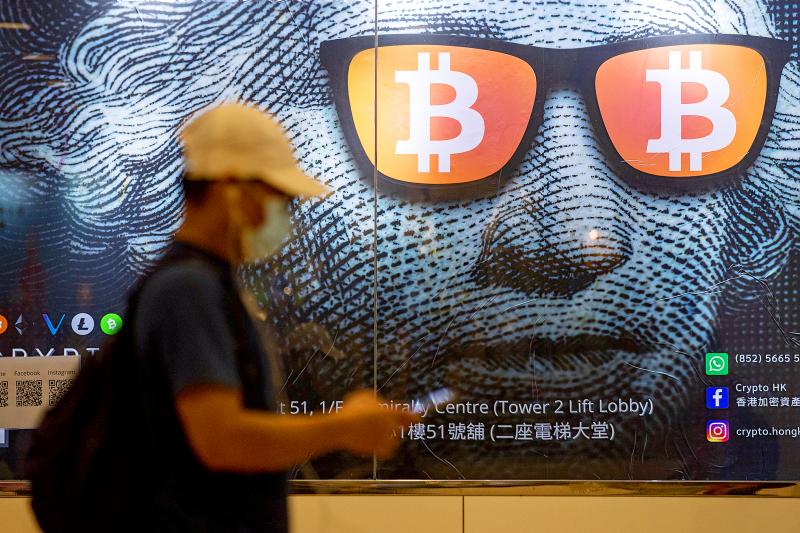Two of the world’s largest bitcoin exchanges have halted new registrations for Chinese users, taking one of the first actions to comply with Beijing’s latest cryptocurrency ban.
Exchange operators Huobi (火幣) and Binance (幣安) have stopped letting traders use mainland China mobile numbers to register new accounts, after the People’s Bank of China (PBOC) on Friday said that all crypto-related transactions would be considered illicit financial activity.
New sign-ups are still available for Hong Kong users on both platforms, but mainland China is no longer an option for new-account creation.

Photo: EPA-EFE
A Huobi spokesperson declined to comment, while a Binance spokesperson said the company does not have exchange operations in China and blocks Chinese IP addresses, without commenting on the mobile registration move.
“Binance takes its compliance obligations very seriously and is committed to following local regulator requirements wherever we operate,” the spokesperson said in an e-mail.
China’s latest pronouncement — issued by the central bank along with nine other government agencies including the public security ministry — is the culmination of years of attempted crackdowns on the rise of bitcoin and its peers.
Friday’s notice specifically called out offshore exchanges targeting Chinese users, banning them from hiring locally for roles from marketing to payment settlement and tech.
In 2017, China told local exchanges to stop hosting trades between fiat money and crypto tokens, forcing Huobi and Binance to set up shops in friendlier jurisdictions such as Singapore and Malta for their main trading platforms.
Still, Chinese users have been able to access their services including over-the-counter trading and crypto-to-crypto transactions.
In June, Huobi banned Chinese users from trading riskier products such as derivatives, after China’s Cabinet called for a renewed clampdown on crypto trading and mining.
There is no indication that Chinese users are barred from Huobi and Binance altogether, which are widely regarded as two of the big three crypto exchanges that originated in China, along with OKEx.
Users can still use mainland China numbers to register on OKEx as of yesterday morning in Hong Kong.
The PBOC’s announcement comes as countries around the world tighten the regulatory screw with the US threatening industry players with lawsuits or cease-and-desist orders. China’s stance comes as the Chinese Communist Party seeks bring key industries to heel from online gaming and tutoring to high-frequency trading.
“This is the latest and perhaps final stage of the Chinese government’s crackdown on crypto,” said Jehan Chu (朱沛宗), founder of investment firm Kenetic Capital in Hong Kong. “China has been consistent about its desire to rid itself of free trading in cryptocurrencies and emphasize more controlled projects.”

Sweeping policy changes under US Secretary of Health and Human Services Robert F. Kennedy Jr are having a chilling effect on vaccine makers as anti-vaccine rhetoric has turned into concrete changes in inoculation schedules and recommendations, investors and executives said. The administration of US President Donald Trump has in the past year upended vaccine recommendations, with the country last month ending its longstanding guidance that all children receive inoculations against flu, hepatitis A and other diseases. The unprecedented changes have led to diminished vaccine usage, hurt the investment case for some biotechs, and created a drag that would likely dent revenues and

Global semiconductor stocks advanced yesterday, as comments by Nvidia Corp chief executive officer Jensen Huang (黃仁勳) at Davos, Switzerland, helped reinforce investor enthusiasm for artificial intelligence (AI). Samsung Electronics Co gained as much as 5 percent to an all-time high, helping drive South Korea’s benchmark KOSPI above 5,000 for the first time. That came after the Philadelphia Semiconductor Index rose more than 3 percent to a fresh record on Wednesday, with a boost from Nvidia. The gains came amid broad risk-on trade after US President Donald Trump withdrew his threat of tariffs on some European nations over backing for Greenland. Huang further

CULPRITS: Factors that affected the slip included falling global crude oil prices, wait-and-see consumer attitudes due to US tariffs and a different Lunar New Year holiday schedule Taiwan’s retail sales ended a nine-year growth streak last year, slipping 0.2 percent from a year earlier as uncertainty over US tariff policies affected demand for durable goods, data released on Friday by the Ministry of Economic Affairs showed. Last year’s retail sales totaled NT$4.84 trillion (US$153.27 billion), down about NT$9.5 billion, or 0.2 percent, from 2024. Despite the decline, the figure was still the second-highest annual sales total on record. Ministry statistics department deputy head Chen Yu-fang (陳玉芳) said sales of cars, motorcycles and related products, which accounted for 17.4 percent of total retail rales last year, fell NT$68.1 billion, or

MediaTek Inc (聯發科) shares yesterday notched their best two-day rally on record, as investors flock to the Taiwanese chip designer on excitement over its tie-up with Google. The Taipei-listed stock jumped 8.59 percent, capping a two-session surge of 19 percent and closing at a fresh all-time high of NT$1,770. That extended a two-month rally on growing awareness of MediaTek’s work on Google’s tensor processing units (TPUs), which are chips used in artificial intelligence (AI) applications. It also highlights how fund managers faced with single-stock limits on their holding of market titan Taiwan Semiconductor Manufacturing Co (TSMC, 台積電) are diversifying into other AI-related firms.